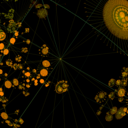Camp 2007 - 1.01
Chaos Communication Camp 2007
To infinity and beyond
| Speakers | |
|---|---|

|
Levien |
| Schedule | |
|---|---|
| Day | 2 |
| Room | Shelter Foo |
| Start time | 18:30 |
| Duration | 01:00 |
| Info | |
| ID | 1968 |
| Event type | Lecture |
| Track | Science |
| Language | English |
| Feedback | |
|---|---|
|
Did you attend this event? Give Feedback |
Life & Complexity
Organisation, information and optimisation in real and simulated biological systems

What is the relationship between energy, information and complexity? How does nature organise itself, and why? How does evolution get from a bacteria to, say, a wombat? How far are we in understanding and simulating life and other complex systems? Although many of these questions are still largely unanswered, some interesting advancements have been made in recent years and decades. A number of these will be discussed and illustrated in this lecture.
Why are organisms and ecosystems the way they are? While science has made great advances in explaining how the parts of such systems work, surprisingly little is still known about why and how the building blocks of living systems and their interactions actually came about. In recent decades we have begun to realise that phenomena such as self-organisation and 'emergent' properties of complex systems play an important role. Unfortunately such systems do not lend themselves very well to study by traditional scientific methods, hence the name 'complex systems'. The arrival of fast computers in the last two decades has made it possible to actually simulate the behaviour and evolution of large collections of simple 'agents'. This, coupled with advances in other fields such as genomics, thermodynamics, and information theory, has made that we are slowly beginning to understand why 'complex systems' behave the way they do.
Topics covered in this lecture are expected to include the following:
The relationship between energy, information and complexity.
Self-organisation and emergent phenomena: why and how does nature organise itself?
The illusion of optimality: why the real world is often not 'optimal'.
How do you get from bacteria to wombat? The importance of multiple levels of organisation.
Computer-models of living systems, how far are we? Some examples of how complex behaviour can emerge from relatively simple systems.
Parallels between evolution and organisation in nature and in artificial systems, such as human society, economics and software/hardware architecture.
